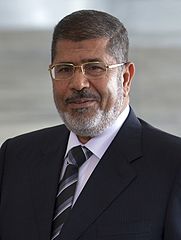Former Egypt president fridge is fine, says EU’s top diplomat
This is high diplomacy for Catherine Ashton, the European Union’s High Representative for Foreign Affairs and Security Policy.
She’s been looking into Mohammed Morsi’s fridge (or at least the fridge that supplies Egypt’s ousted president with his tuck) and she finds everything in order. The fridge light must have been on and presumably there was milk and eggs and butter, along with fruit and some of that health-giving green stuff (veggies).
The Baroness, who seems a genuinely comforting and kind woman but probably not a diplomat in the Kissinger, Kerry or even Clinton mould , told the BBC’s Jim Muir today that she made it a point to open the Morsi fridge to reassure herself (and Mr Morsi’s family) that Egypt’s portly deposed leader was not obliged to miss any meals. (She didn’t put it quite that way but we get the drift.)
It would all be a great deal more reassuring if we had some sense that the EU’s top diplomat had done more than look into Mr Morsi’s fridge. She might have looked into Mr Morsi’s affairs or the strange case of the vanishing elected president.
She has made no protest about not knowing where she met Mr Morsi; she has said little about the circumstances of the appointment. Bland generalizations about Mr Morsi’s health and spirits are all very well but surely more was needed?
Yes, but it’s a moot point if Baroness Ashton could provide it.
When the British Labour peer became ‘Ms Europe’ in 2009, she was effectively the Union’s equivalent of the US secretary of state. But many around the world struggled to put face to name and the Baroness was generally dismissed as colourless, opinion-free and sans the big personality and charisma to do the job.
In April, the European Parliament’s Foreign Affairs Committee agreed rather publicly. The Committee, which oversees the newly created European diplomatic corps or the European External Action Service, criticised the way it is run, lambasting it as “too top-heavy and marked by too many decision-making layers”. It devastatingly added that the EU’s top diplomat often reacts to events too late. For instance, during the protests in Cairo that were supposed to herald ‘the Arab Spring’, Ms Ashton had to be asked several times before she finally flew to Cairo.
Presumably not to look into refrigerators though.


